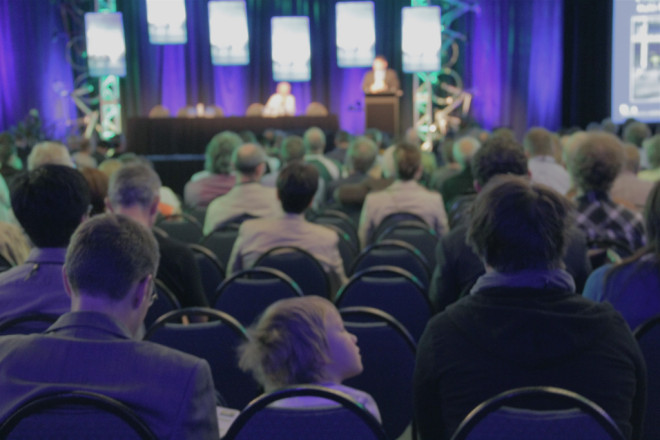
The Canadian Perspective Day 2: Velo-city Live Coverage
So what did the Canadians think of the world's biggest cycling planning conference? What were their highlights? Velo-city Communications Manager, Mark Mauchline fills us in on his favourite moments of Day 2 of Velo-city.
Day two of Velo-city Global 2012 dawned bright and sunny, and began with a plenary session focusing on bicycling efforts the City of Vancouver was using to forge its way to Greenest City status.
Chaired by former City Councillor Gordon Price, a.k.a. “Councillor Bikeways”, the presentations took the audience through Vancouver’s cycling infrastructure evolution, as told by four individuals involved on different levels.
Councillor Heather Deal, Brent Toderian of TODERIAN UrbanWORKS, Director of Transportation Jerry Dobrovolny, and Active Transportation Manager Dale Bracewell gave delegates a detailed account of Vancouver’s cycling issues, complete with lots of stats, the background story, and goals for the future.

Brent Toderian Speaking at the conference
Dale Bracewell even took on Gil Penalosa’s challenge to set the city’s sights higher. Referring to Penalosa’s 8-80 Cities organization, a good-humoured Bracewell claimed Vancouver was aiming to target improved liveability for the 4-84 year-old age bracket. He then went on to recount his own bike to school route on pathways as a four year-old, complete with local images from Google Maps.
The afternoon “Cities in Motion” session had Lord Mayor Stephen Yarwood sharing the efforts Adelaide is making to grow its central business district into a desired destination. An important part of that is the inclusion of more cycling infrastructure with the goal of making his South Australian city the cycling capital of the southern hemisphere. In no nonsense Australian style, the Lord Mayor also suggested the helmet debate should stop, and the energy redirected to the issue of cycling safety.
Lise Thorsen, a member of Copenhagen’s Technical and Environmental Committee stated the city’s goal of becoming carbon neutral by 2025. As well, she suggested Copenhagen, the poster child for cycling infrastructure, might have to look further afield to its outside communities in order to attain 50% bicycle mode share.
Almost lost to the conference due to travel delays was Vienna Deputy Mayor Maria Vassilakou. Vassilakou walked directly to the podium upon arriving at the conference. She spoke of “the sound of cycling”: hearing and feeling the city outside the car windshield. It was a fitting juxtaposition to what must have been a hectic day of trave
A welcomed addition to the session was the Marshall and Chief Executive of the Nigerian Road Safety Corps, Mr. Osita Chidoka, who shared the fact he had ridden a bicycle to his wedding. He then spelled out for delegates a simple truth: countries like his do not possess the finances to pay for large-scale automobile infrastructure, let alone do it well. It was a poignant reminder of the reality for not only much of Africa, but for other parts of the world.
“For Nigeria, investing in cycling infrastructure is an economic imperative.”
Live Coverage from Velo-city
ECF is reporting this story live from the world’s largest cycling policy in Vancouver, Canada where nearly 1,000 of the cycling world’s best and brightest have gathered for four days to talk cycling. You can read more stories from our Velo-city live page and tweet #velocity2012 to join in the conversation.

About the Author
Vancouver resident Mark Mauchline has worked as a producer and director on critically acclaimed, award-winning television series, and documentary films since 2003 and has bicycled, hiked and paddled in thirty countries on five continents. He is the current Communications Manager for the Velo-city Global conference in Vancouver.
Contact the author
Recent news!
Upcoming events
Contact Us
Avenue des Arts, 7-8
Postal address: Rue de la Charité, 22
1210 Brussels, Belgium










